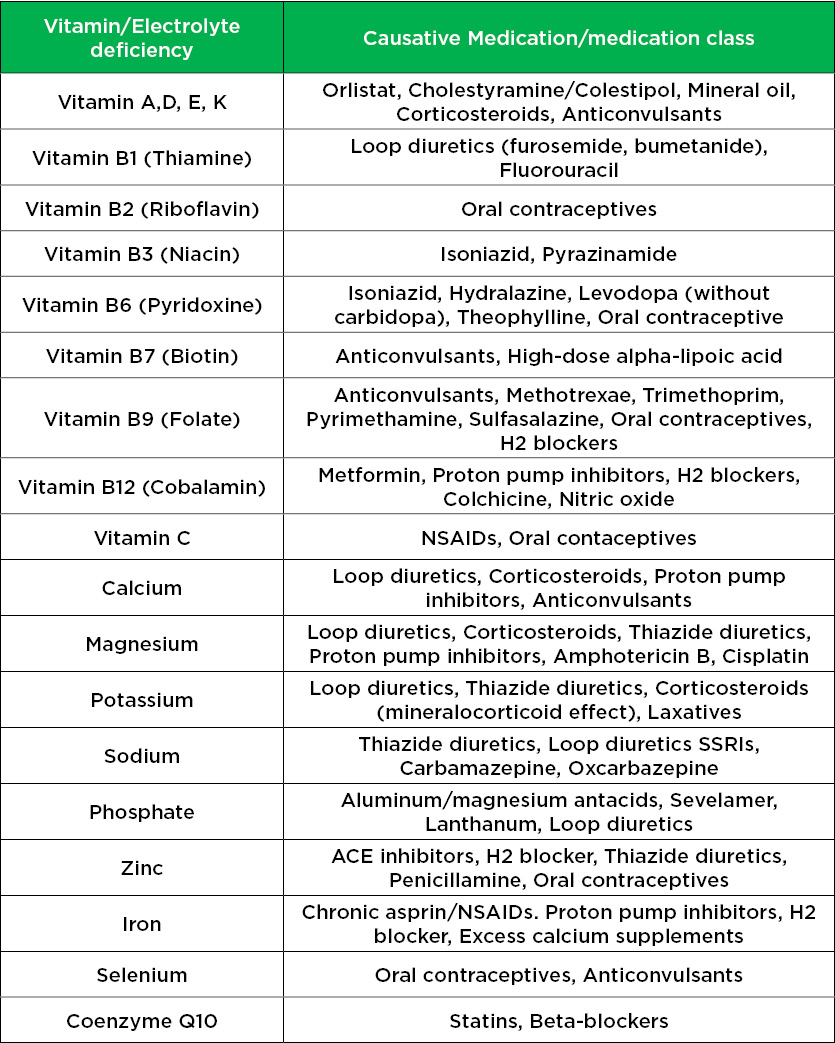
This post was written by Naana Boachie, PharmD, BCACP, Parkview Health.
Did you know that some of the prescriptions and over-the-counter medications we take for our health can sometimes cause a decrease in certain nutrients in the body? In this post, we will highlight some common medications that can cause one or more deficiencies, along with tips to address them.
Nutrients and electrolytes
Minerals and vitamins are essential for energy production, metabolism and overall health. Electrolytes are substances that have a natural positive or negative electrical charge when dissolved in water. Some examples include sodium, chloride, potassium and magnesium. They help the body regulate chemical reactions, assist with heart and muscle conduction and maintain balance between fluids inside and outside the cells.
When the body is lacking in these nutrients, it can cause symptoms that look like:
-
Loss of color in the skin
-
Weakness
-
Poor memory
-
Changes in appetite
-
Tingling or numbness
-
Trouble breathing
Acid-suppressing agents
These are medications to help reduce stomach acid production or neutralize stomach acids. They include medication classes like:
-
Proton pump inhibitors: omeprazole, pantoprazole, lansoprazole
-
H2 blockers: famotidine and ranitidine
-
Antacids: magnesium hydroxide and aluminum hydroxide (Maalox®) and calcium carbonate (Tums®)
Antacids can interfere with nutrient absorption, and prolonged use can result in certain electrolyte and nutrient deficiencies.
-
Proton pump inhibitors may reduce levels of calcium, magnesium, iron and vitamin B12.
-
H2 blockers may reduce vitamin B12, folate, zinc and iron levels
-
Antacids may reduce zinc, calcium, vitamin B12 and iron levels. Antacids with calcium, aluminum or magnesium, like Tums and Maalox, can also reduce levels of phosphate.
Anticonvulsants
Anticonvulsants or anti-epileptic drugs like phenytoin, phenobarbital, carbamazepine, and valproic acid are typically used to treat seizure disorders.
They cause deficiencies in patients taking these medications, either by depleting or preventing the absorption of nutrients. As a class, they are associated with calcium deficiency.
-
Phenytoin and carbamazepine can reduce levels of biotin, calcium, vitamins D, B7 and B9.
-
Valproic acid can reduce levels of folic acid, carnitine, copper, selenium and zinc.
Corticosteroids
Corticosteroids are synthetic agents that mimic cortisol, a naturally occurring hormone in the body. They are often used to treat inflammation and pain, as well as to calm down the immune system.
Medications like prednisone, triamcinolone and methylprednisolone can cause nutrient depletion by preventing absorption, increasing elimination and affecting the body's ability to store and make certain nutrients.
Corticosteroids can reduce the levels of several nutrients, with the primary ones being calcium and vitamin D. Other deficiencies include magnesium, zinc, potassium and vitamin K.
Diuretics or "water pills"
They are medications that increase urination, which can lead to the loss of several electrolytes. There are two main types of diuretics:
-
Loop diuretics: furosemide, bumetanide and torsemide
-
Thiazide diuretics: hydrochlorothiazide and chlorthalidone
They work at different sites in the kidneys and, as a result, will cause different electrolyte deficiencies.
-
Loop diuretics can reduce the levels of potassium, sodium, calcium, magnesium and phosphate.
-
Thiazide diuretics can reduce the levels of potassium, sodium and magnesium.
Laxatives
Laxatives are medications that encourage bowel movement by softening the stool or stimulating the intestines to contract. They may also remove fluids and water from the body. These substances include senna, milk of magnesia and polyethylene glycol (Miralax).
Do not overuse laxatives. Excessive use can cause diarrhea, which in turn leads to multiple electrolyte deficiencies such as low potassium, sodium and calcium. If you experience diarrhea from laxative use, consider opting for oral rehydration packets to help replenish lost electrolytes.
Nonsteroidal anti-inflammatory drugs (NSAIDs)
NSAIDs are common medications used to treat pain and reduce fevers, including ibuprofen (Motrin®), naproxen (Aleve®) and aspirin.
They can cause electrolyte and vitamin deficiencies by increasing the excretion of sodium, potassium and vitamin C in the urine, leading to low levels in the body.
Oral contraceptives
Synthetic forms of the hormones estrogen and progesterone are used to prevent pregnancy or regulate the menstrual cycle.
They may reduce the absorption of folic acid and affect vitamin B6 metabolism, while increasing magnesium uptake in bones, leading to multiple deficiencies, including low magnesium, iron, vitamins B12, B6, and B9, as well as vitamin C.
Cholesterol-lowering agents
Statins are a form of medication prescribed to reduce cholesterol levels in the body. They include drugs like atorvastatin, rosuvastatin and pravastatin.
They work by preventing HMG-CoA reductase, an enzyme needed to produce cholesterol and Coenzyme Q10 (CoQ10). As a result, they can lead to low levels of CoQ10 in the body. Taking this antibiotic as a supplement can help alleviate this issue.
Addressing deficiency
While everyone's response to medications can differ, here are a few things you can do to help prevent nutrient deficiencies.
-
Eat a balanced diet to ensure adequate intake of basic minerals and vitamins
-
Get routine blood tests to monitor for electrolytes, iron levels and certain vitamins like vitamins D and B12.
-
Consider taking supplements targeting specific deficiencies.
-
Consult with your healthcare provider to develop a treatment plan specific to you.
Learn more
The table below provides a quick reference of nutrient and electrolyte deficiencies and the possible medications that cause them. For specific guidance on medication interactions and side effects, always speak with your local pharmacist or primary care provider.

For more information on pharmacy services, contact or visit a location near you.



